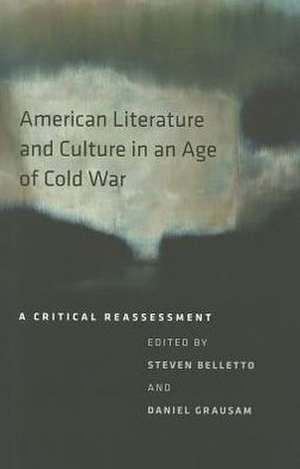American Literature and Culture in an Age of Cold War: A Critical Reassessment: New American Canon
Editat de Steven Belletto, Daniel Grausamen Limba Engleză Paperback – 30 sep 2012
The time is right for a critical reassessment of Cold War culture both because its full cultural impact remains unprocessed and because some of the chief paradigms for understanding that culture confuse rather than clarify.
A collection of the work of some of the best cultural critics writing about the period, American Literature and Culture in an Age of Cold War reveals a broad range of ways that American cultural production from the late 1940s to the present might be understood in relation to the Cold War. Critically engaging the reigning paradigms that equate postwar U.S. culture with containment culture, the authors present suggestive revisionist claims. Their essays draw on a literary archive—including the works of John Updike, Joan Didion, Richard E. Kim, Allen Ginsberg, Edwin Denby, Alice Childress, Frank Herbert, and others—strikingly different from the one typically presented in accounts of the period.
Preț: 342.47 lei
Preț vechi: 373.24 lei
-8% Nou
Puncte Express: 514
Preț estimativ în valută:
65.53€ • 70.08$ • 54.64£
65.53€ • 70.08$ • 54.64£
Carte indisponibilă temporar
Doresc să fiu notificat când acest titlu va fi disponibil:
Se trimite...
Preluare comenzi: 021 569.72.76
Specificații
ISBN-13: 9781609381134
ISBN-10: 1609381130
Pagini: 256
Ilustrații: 5 illustrations
Dimensiuni: 152 x 229 x 23 mm
Greutate: 0.36 kg
Ediția:1
Editura: University of Iowa Press
Colecția University Of Iowa Press
Seria New American Canon
ISBN-10: 1609381130
Pagini: 256
Ilustrații: 5 illustrations
Dimensiuni: 152 x 229 x 23 mm
Greutate: 0.36 kg
Ediția:1
Editura: University of Iowa Press
Colecția University Of Iowa Press
Seria New American Canon
Recenzii
“A watershed moment in the current revitalization of Cold War studies. The editors have brought together a strong group of cultural critics to revise and extend the insights of the foundational ‘containment culture’ work of Thomas Schaub, Alan Nadel, and Ellen Schrecker. From its rereadings of figures we thought we knew, to its reconsiderations of concepts we thought we’d mastered, to Nadel’s own revisitation and extension of his work, this book will help those of us in English, American studies, cultural studies, history, and sociology who thought we knew the Cold War to think again.”—Samuel Cohen, author, After the End of History
“American Literature and Culture in an Age of Cold War helps explain not only the Cold War, but also our present nostalgia for it. Belletto and Grausam collected rich and far-ranging essays representing the best contemporary work on a key moment of American political and literary culture, contributing significantly to a global understanding of the Cold War and enriching the contemporary discussion of the relationship between politics and cultural production.”—Priscilla Wald, author, Contagious: Cultures, Carriers, and the Outbreak Narrative
Notă biografică
An assistant professor of English and chair of the American Studies program at Lafayette College, Steven Belletto is the author of No Accident, Comrade: Chance and Design in Cold War American Narratives (Oxford, 2012) and has published essays on postwar literature and culture in such journals as ELH, American Quarterly, Clio, Criticism, and Genre. He is an associate editor of the journal Contemporary Literature. Daniel Grausam is the author of On Endings: American Postmodern Fiction and the Cold War (Virginia, 2011) and is currently completing Half Lives: The Legacies of the First Nuclear Age, an interdisciplinary study of post–Cold War American nuclear culture.
Descriere
A collection of the work of some of the best cultural critics writing about the period, American Literature and Culture in an Age of Cold War reveals a broad range of ways that American cultural production from the late 1940s to the present might be understood in relation to the Cold War. Critically engaging the reigning paradigms that equate postwar U.S. culture with containment culture, the authors present suggestive revisionist claims. Their essays draw on a literary archive—including the works of John Updike, Joan Didion, Richard E. Kim, Allen Ginsberg, Edwin Denby, Alice Childress, Frank Herbert, and others—strikingly different from the one typically presented in accounts of the period.












